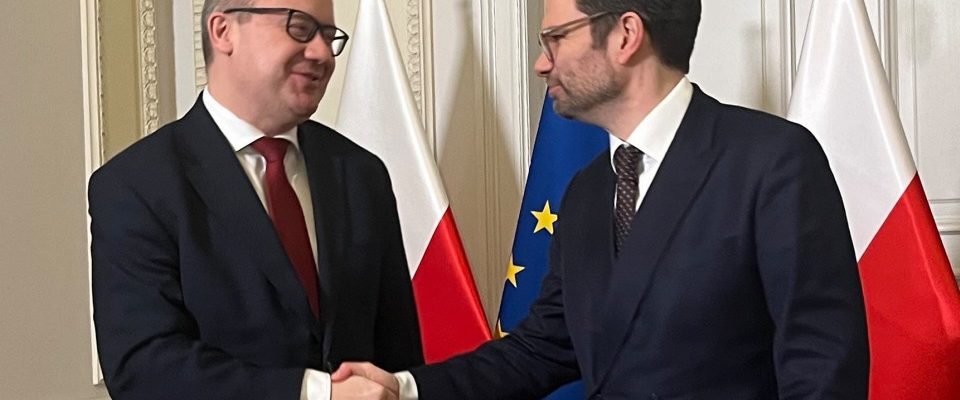“There is no competition as to who is first.” Marco Buschmann modestly admits that it is actually more or less a coincidence that he, of all people, is now the first official German visitor to the new Polish government. On Tuesday, the Federal Minister of Justice traveled first to Estonia, then to Poland and met Adam Bodnar, the Polish Minister of Justice, in Warsaw. The liberal-conservative government under Prime Minister Donald Tusk has been in office since December 13th.
But this is Poland, and there are basically no coincidences there. Everything has its meaning. First of all, there is a thaw. Snow drips onto the tour group from the stucco ornaments of the rebuilt magnificent buildings in Warsaw’s ministry district. And when you hear Buschmann talk about the new Polish government’s “very courageous decisions” to strengthen the rule of law, you can also feel the thaw between the two neighboring countries.
The president speaks of the “terror of the rule of law”
Secondly, President Andrzej Duda chose this evening of all days to ignore a recommendation from Justice Minister Bodnar. Which puts you right in the middle of the Polish dispute over the rule of law. The new government wants to restore this in line with rulings by the European Court of Justice. The president and the PiS lawyers in the courts, including the Constitutional Court, are resisting. Duda recently spoke of a “terror of the rule of law.”
On Tuesday evening, the president announced that he would pardon Maciej Wąsik and Mariusz Kamiński again. Exactly two weeks earlier, also on a Tuesday evening, the former PiS Interior Minister Kamiński and his close colleague Wąsik were taken away by police officers from the president’s office. There was an arrest warrant against the two. They were sentenced to two years in prison for abuse of office and document falsification.
Because the president had already pardoned the two in 2015, they were able to pursue their careers during eight years of PiS government. At that time, however, the verdict was not yet final; it only became so at the end of December – and now Andrzej Duda and the PiS politicians are calling the two convicts “political prisoners.” They were released late Tuesday evening.
During his speech, the Interior Minister was caught up in the Middle East conflict
So who in the Polish government, other than Prime Minister Donald Tusk, could currently be more important than the Minister of Justice? Buschmann was impressed by his new colleague. Bodnar had already fought against interference in the independent judiciary as an ombudsman for civil rights during the PiS government.
But he doesn’t want to comment on Polish domestic politics, Buschmann tells the television camera. Then indirectly he does it an hour later. The FDP politician gives a lecture on “Freedom and Law in Europe” to around 60 law students at the University of Warsaw.
He speaks in English – which is sometimes a blessing when Europeans with different native languages have to talk to each other. It creates a certain, civilized distance. Buschmann had barely spoken for a few minutes in the lecture hall when he was interrupted by a protest. A student calmly criticizes Germany’s Israel policy, while six others hold up signs next to her that say, among other things: “Stop Germany’s unconditional support of the Israeli Government.”
Students interrupt Bushmann’s speech at the University of Warsaw with protests against the war in Gaza.
(Photo: Antoni Kobus)
Germany should therefore end its “unconditional support of the Israeli government”. Buschmann tries to reply. But don’t get a word in edgewise. And the Polish event manager calls “Order” into the lecture hall in the most beautiful Lower House English. Until the students finally leave. It later turns out that they were all foreign students, including Germans.
Freedom and justice in Europe are about fairness, says Buschmann
Seconds later, Buschmann is already talking about the Hambach Festival and the “Polish enthusiasm”, i.e. the enthusiasm for the Polish struggle for freedom. An enthusiasm that was first a thorn in the side of the German kings and later the heads of the State Council of the GDR. A few more minutes of the Polish fight for freedom and Buschmann has arrived at the rule of law in his overall compact speech. Anyone who speaks about freedom and justice in Europe is never directed against anyone. “It’s about fairness.”
Everything else sounds like a pure commentary on what Duda, a lawyer by training, is thinking up in his official residence, a five-minute walk away. The constitution of a state, says Buschmann, must be stable. It should shape the changing, democratic life, not the other way around. Independent courts to review political decisions should be open to everyone.
“Try to stick to the principles of the rule of law,” Buschmann then answers in a question and answer session from a Polish doctoral student. “You don’t have to give your life for it, not everyone can be a hero. But if you had to choose between the principles of the rule of law and your career…” The Minister of Justice weighs his head. “Then you’d better stick to the principles.”

